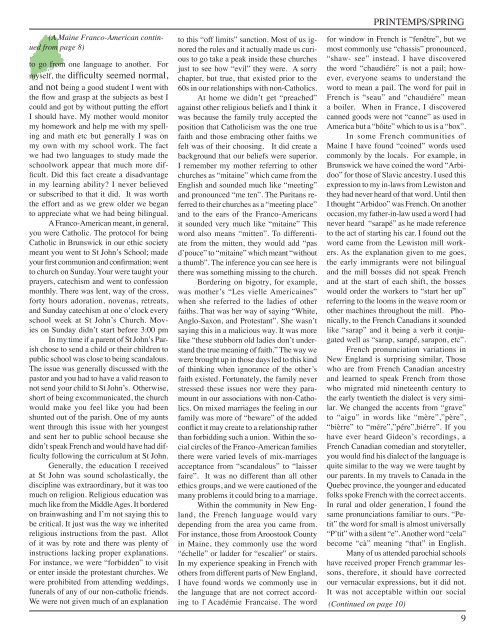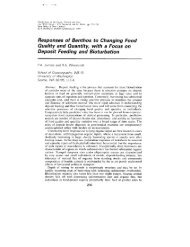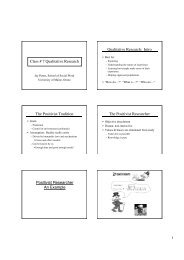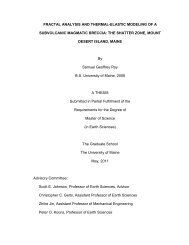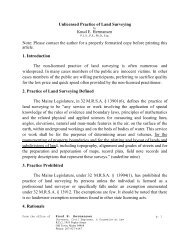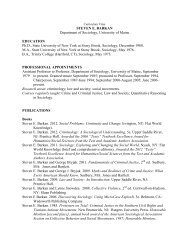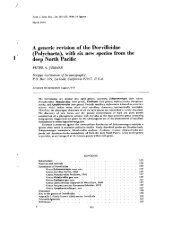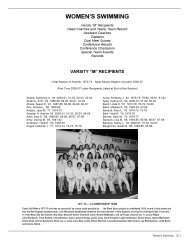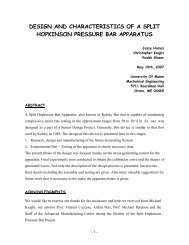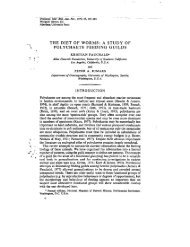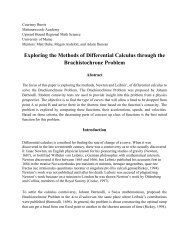Le FORUM - University of Maine
Le FORUM - University of Maine
Le FORUM - University of Maine
You also want an ePaper? Increase the reach of your titles
YUMPU automatically turns print PDFs into web optimized ePapers that Google loves.
(A <strong>Maine</strong> Franco-American continued<br />
from page 8)<br />
to go from one language to another. For<br />
myself, the difficulty seemed normal,<br />
and not being a good student I went with<br />
the flow and grasp at the subjects as best I<br />
could and got by without putting the effort<br />
I should have. My mother would monitor<br />
my homework and help me with my spelling<br />
and math etc but generally I was on<br />
my own with my school work. The fact<br />
we had two languages to study made the<br />
schoolwork appear that much more difficult.<br />
Did this fact create a disadvantage<br />
in my learning ability? I never believed<br />
or subscribed to that it did. It was worth<br />
the effort and as we grew older we began<br />
to appreciate what we had being bilingual.<br />
A Franco-American meant, in general,<br />
you were Catholic. The protocol for being<br />
Catholic in Brunswick in our ethic society<br />
meant you went to St John’s School; made<br />
your first communion and confirmation; went<br />
to church on Sunday. Your were taught your<br />
prayers, catechism and went to confession<br />
monthly. There was lent, way <strong>of</strong> the cross,<br />
forty hours adoration, novenas, retreats,<br />
and Sunday catechism at one o’clock every<br />
school week at St John’s Church. Movies<br />
on Sunday didn’t start before 3:00 pm<br />
In my time if a parent <strong>of</strong> St John’s Parish<br />
chose to send a child or their children to<br />
public school was close to being scandalous.<br />
The issue was generally discussed with the<br />
pastor and you had to have a valid reason to<br />
not send your child to St John’s. Otherwise,<br />
short <strong>of</strong> being excommunicated, the church<br />
would make you feel like you had been<br />
shunted out <strong>of</strong> the parish. One <strong>of</strong> my aunts<br />
went through this issue with her youngest<br />
and sent her to public school because she<br />
didn’t speak French and would have had difficulty<br />
following the curriculum at St John.<br />
Generally, the education I received<br />
at St John was sound scholastically, the<br />
discipline was extraordinary, but it was too<br />
much on religion. Religious education was<br />
much like from the Middle Ages. It bordered<br />
on brainwashing and I’m not saying this to<br />
be critical. It just was the way we inherited<br />
religious instructions from the past. Allot<br />
<strong>of</strong> it was by rote and there was plenty <strong>of</strong><br />
instructions lacking proper explanations.<br />
For instance, we were “forbidden” to visit<br />
or enter inside the protestant churches. We<br />
were prohibited from attending weddings,<br />
funerals <strong>of</strong> any <strong>of</strong> our non-catholic friends.<br />
We were not given much <strong>of</strong> an explanation<br />
to this “<strong>of</strong>f limits” sanction. Most <strong>of</strong> us ignored<br />
the rules and it actually made us curious<br />
to go take a peak inside these churches<br />
just to see how “evil” they were. A sorry<br />
chapter, but true, that existed prior to the<br />
60s in our relationships with non-Catholics.<br />
At home we didn’t get “preached”<br />
against other religious beliefs and I think it<br />
was because the family truly accepted the<br />
position that Catholicism was the one true<br />
faith and those embracing other faiths we<br />
felt was <strong>of</strong> their choosing. It did create a<br />
background that our beliefs were superior.<br />
I remember my mother referring to other<br />
churches as “mitaine” which came from the<br />
English and sounded much like “meeting”<br />
and pronounced “me ten”. The Puritans referred<br />
to their churches as a “meeting place”<br />
and to the ears <strong>of</strong> the Franco-Americans<br />
it sounded very much like “mitaine” This<br />
word also means “mitten”. To differentiate<br />
from the mitten, they would add “pas<br />
d’pouce” to “mitaine” which meant “without<br />
a thumb”. The inference you can see here is<br />
there was something missing to the church.<br />
Bordering on bigotry, for example,<br />
was mother’s “<strong>Le</strong>s vielle Americaines”<br />
when she referred to the ladies <strong>of</strong> other<br />
faiths. That was her way <strong>of</strong> saying “White,<br />
Anglo-Saxon, and Protestant”. She wasn’t<br />
saying this in a malicious way. It was more<br />
like “these stubborn old ladies don’t understand<br />
the true meaning <strong>of</strong> faith.” The way we<br />
were brought up in those days led to this kind<br />
<strong>of</strong> thinking when ignorance <strong>of</strong> the other’s<br />
faith existed. Fortunately, the family never<br />
stressed these issues nor were they paramount<br />
in our associations with non-Catholics.<br />
On mixed marriages the feeling in our<br />
family was more <strong>of</strong> “beware” <strong>of</strong> the added<br />
conflict it may create to a relationship rather<br />
than forbidding such a union. Within the social<br />
circles <strong>of</strong> the Franco-American families<br />
there were varied levels <strong>of</strong> mix-marriages<br />
acceptance from “scandalous” to “laisser<br />
faire”. It was no different than all other<br />
ethics groups, and we were cautioned <strong>of</strong> the<br />
many problems it could bring to a marriage.<br />
Within the community in New England,<br />
the French language would vary<br />
depending from the area you came from.<br />
For instance, those from Aroostook County<br />
in <strong>Maine</strong>, they commonly use the word<br />
“échelle” or ladder for “escalier” or stairs.<br />
In my experience speaking in French with<br />
others from different parts <strong>of</strong> New England,<br />
I have found words we commonly use in<br />
the language that are not correct according<br />
to l`Académie Francaise. The word<br />
for window in French is “fenêtre”, but we<br />
most commonly use “chassis” pronounced,<br />
“shaw- see” instead. I have discovered<br />
the word “chaudiére” is not a pail; however,<br />
everyone seams to understand the<br />
word to mean a pail. The word for pail in<br />
French is “seau” and “chaudiére” mean<br />
a boiler. When in France, I discovered<br />
canned goods were not “canne” as used in<br />
America but a “bôite” which to us is a “box”.<br />
In some French communities <strong>of</strong><br />
<strong>Maine</strong> I have found “coined” words used<br />
commonly by the locals. For example, in<br />
Brunswick we have coined the word “Arbidoo”<br />
for those <strong>of</strong> Slavic ancestry. I used this<br />
expression to my in-laws from <strong>Le</strong>wiston and<br />
they had never heard <strong>of</strong> that word. Until then<br />
I thought “Arbidoo” was French. On another<br />
occasion, my father-in-law used a word I had<br />
never heard “sarapé” as he made reference<br />
to the act <strong>of</strong> starting his car. I found out the<br />
word came from the <strong>Le</strong>wiston mill workers.<br />
As the explanation given to me goes,<br />
the early immigrants were not bilingual<br />
and the mill bosses did not speak French<br />
and at the start <strong>of</strong> each shift, the bosses<br />
would order the workers to “start her up”<br />
referring to the looms in the weave room or<br />
other machines throughout the mill. Phonically,<br />
to the French Canadians it sounded<br />
like “sarap” and it being a verb it conjugated<br />
well as “sarap, sarapé, sarapon, etc”.<br />
French pronunciation variations in<br />
New England is surprising similar. Those<br />
who are from French Canadian ancestry<br />
and learned to speak French from those<br />
who migrated mid nineteenth century to<br />
the early twentieth the dialect is very similar.<br />
We changed the accents from “grave”<br />
to “aigu” in words like “mère”,”père”,<br />
“bièrre” to “mére”,”pére”,biérre”. If you<br />
have ever heard Gideon’s recordings, a<br />
French Canadian comedian and storyteller,<br />
you would find his dialect <strong>of</strong> the language is<br />
quite similar to the way we were taught by<br />
our parents. In my travels to Canada in the<br />
Quebec province, the younger and educated<br />
folks spoke French with the correct accents.<br />
In rural and older generation, I found the<br />
same pronunciations familiar to ours. “Petit”<br />
the word for small is almost universally<br />
“P’tit” with a silent “e”. Another word “cela”<br />
become “cà” meaning “that” in English.<br />
Many <strong>of</strong> us attended parochial schools<br />
have received proper French grammar lessons,<br />
therefore, it should have corrected<br />
our vernacular expressions, but it did not.<br />
It was not acceptable within our social<br />
(Continued on page 10)<br />
PRINTEMPS/SPRING<br />
9


